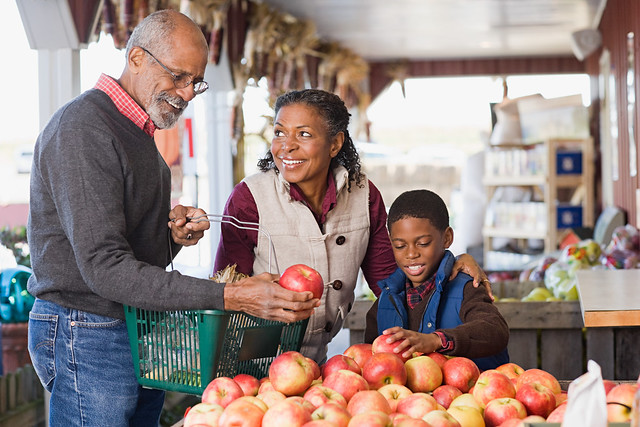
Note: National Grandparents Day is Sept. 9. Since Aug. 3, 1978, the day has been set aside “to honor grandparents… and help children become aware of the strength, information, and guidance older people can offer.”
The scene has played out millions of times in recent years – American children waking up to find their parents unable to care for them. Fortunately, some 2.7 million grandparents have stepped in to fill the critical role of caregiver, according to the 2010 Census.
Though a labor of love, these altruistic acts often do not come without a price; many grandparents find themselves struggling to cope with the rigors of modern caregiving. But, they’re not alone. Cooperative extension programs in many communities provide education and support to the second-time-around parents.
Managed by state land-grant universities, and with financial support from USDA’s National Institute of Food and Agriculture (NIFA), extension educators offer classes ranging from nutrition and meal planning, to child development, and legal issues and financial challenges. The following three projects are examples of programs that NIFA supports to help “grandfamilies” thrive.
In West Virginia, 1 in 14 children is the product of a grandfamily – the fourth highest rate in the nation. West Virginia State University is helping to ease the transition for grandparents raising their grandchildren with its Healthy Grandfamilies initiative. The program features a series of nine discussion sessions and follow-up services with a licensed social worker. Topics include social media, navigating the school and legal systems, and health literacy.
In Montana, more than 7,400 grandparents are raising their grandchildren without parental involvement. In response, Montana State University (MSU) Extension developed its Grandparents Raising Grandchildren (GRG) Project to provide support, education, and workshops. In addition, MSU researchers are studying grandparent well-being and have published several articles on GRG mental health, role conflict, child behavior problems, stress, and more.
Cornell University in 2011 began its Parenting a Second Time Around (PASTA) program with New York City in mind, where more than 68,000 grandparents are responsible for their grandchildren. PASTA’s participants reported that the program helped them to better care for themselves as caregivers, increased confidence in guiding child behavior, and increased their capabilities in meeting the emotional needs of a child. Based on its initial success, PASTA in 2014 began a second phase with the goal of reaching Spanish-speaking kinship caregivers and caregivers who are raising children with disabilities.
Additional federal assistance is on the way, as President Donald Trump on July 9 signed into law the Supporting Grandparents Raising Grandchildren Act. The Act will create a one-stop-shop of resources to support grandparents raising grandchildren.
NIFA invests in and advances agricultural research, education, and extension and seeks to make transformative discoveries that solve societal challenges.



